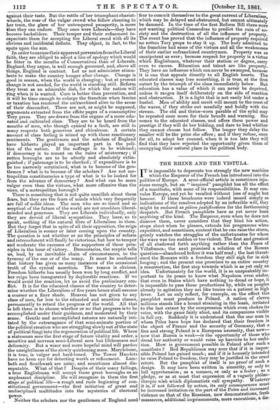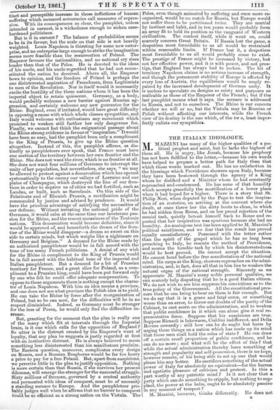THE RHINE AND THE VISTULA.
IT is impossible to deprecate too strongly the new machine which the Emperor of the French has introduced into the politics of Europe. A semi-official article is sometimes inju- rious enough, but an "inspired" pamphlet has all the effect of a manifesto, with none of its responsibilities. It may con- vulse Europe, and yet be recalled without loss of aught but honour. If these brochures were indeed issued simply as indications of the resolves adopted by an inflexible will, they might be endured as pieces justfficaiives for the forthcoming despatch. But French pamphlets have as yet never been anything of the kind. The Emperor, even when be does not disavow them, never considers that they bind his action, stops short when he pleases extends his programme when expedient, and sometimes, content that he can raise the storm, grimly watches the struggles of the unfortunates for whom the wave was too sudden or too violent. The first and greatest of all shadowed forth anything rather than the Peace of Villafranca the next promised a solution of the Roman question—abandoned before it was half read ; the last threat- ened the Romans with a freedom they still sigh for in sick longing ; and the present one promises to an entire country a resurrection, the first step towards which is as yet only an idea. Unfortunately for the world, it is so unspeakably im- portant to its peace to know what Napoleon even wishes, that even in States which have nothing to dread or hope, it is impossible to pass these productions by, while on peoples already in agitation they act like tonics on a patient in high fever. Let us only reflect, for example, on the effect this pamphlet must produce in Poland. A nation of eleven millions stands like a hound straining in the leash, irritated to the last extent by the compression which even chokes its voice, with the game fairly afoot, and its companions visible in full cry. Suddenly it is understood that the one man in whom Poles have hope has declared that ,their freedom is the object of France and the security of Germany, that a free and strong Poland is a European necessity, that now— now that Russia is weak—is the opportunity of those who dread her authority or would raise up barriers to her ambi- tion. How is government possible in Poland after such a manifesto ? Red Republicans may aver that if it is impos- sible Poland has gained much ; and if it is honestly intended to raise Poland to freedom, they may be justified in the cruel retort. But the pamphlet of itself is no proof of such a design. It may have been written in sincerity, or only to lull apprehension ; as a menace, or only as a feeler ; as a pledge, or as at most that expression of a vaguely philan- thropic wish which diplomatists call sympathy. Whatever it is, if not followed by action, its only consequences must be increased irritation on the part of the Poles and increased violence on that of the Russians, new demonstrations, fresh massacres, additional imprisonments, more executions, a dit. tinct and perceptible increase in those inflictions of human suffering which menaced autocracies call measures of repres- sion. With its consequences so clear, the pamphlet, unless intended in earnest, is a wickedness enough to sicken case- hardened politicians. But is it in earnest ? The balance of probabilities seems to be in its favour, but the scale on that side is not heavily weighted. Louis Napoleon is thirsting for some new enter- prise, and no enterprise large enough to strike the imagination seems more feasible than the resurrection of Poland. The Emperor favours the nationalities, and no national cry rises louder than that of the Poles. He is devoted to the ideas of his uncle, and his uncle regretted that he had not recon- stituted the nation he deceived. Above all, the Emperor bows to opinion, and the freedom of Poland is perhaps the one disinterested aspiration of Frenchmen, from Legitimists to men of the Revolution. Nor in itself would it necessarily excite the hostility of the three nations whom it has been the imperial object to retain quiescent. Germany, as a body, would probably welcome a new barrier against Russian ag- gression, and certainly welcome any new guarantee for the Rhine. England, even if irritated, would have great difficulty in opposing a cause with which whole classes sympathize, and Italy would welcome with enthusiasm any movement which promised to weaken still further her only dangerous foe. Finally, we cannot but think the enigmatical passage about the Rhine strong evidence in favour of "inspiration." Itwould have been so easy, had the pamphlet been only a compliment to the King of Prussia, to give up the Rhine question altogether. Instead of this, the pamphlet affirms, as dis- tinctly as pamphleteers ever speak, that France must have one section of the territory between her own frontier and the Rhine. She does not want the river, which is no frontier at all. She does not want four millions of Germans to interrupt the unity of her population, but nevertheless, she says, "we may be allowed to protest against a demarcation which has opened systematically to the enemy our valleys of Lorraine and our plains of Champagne, which destroyed the line of our fron- tiers in order to deprive us of cities we had fortified, such as Landau, or built, such as Sarrelouis. On this side of the Palatinate and of Rhenish Prussia, a rectification might be commanded by justice and advised by prudence. It would have the priceless advantage of satisfying the necessities of our defence. Without irritating the national pride of the Germans, it would calm at the same time our inveterate pas- sion for the Rhine, and the recent uneasiness of the Teutonic nations. This demarcation would become definitive, since it would be approved of, and henceforth the dream of the fron- tier of the Rhine would disappear—a dream so sweet on this side to certain minds, but which weighs like a nightmare on Germany and Belgium." A demand for the Rhine made by an authorized pamphleteer would be in full accord with the tone of too many French politicians. A denial of any wish for the Rhine in compliment to the King of Prussia would be in full accord with the habitual tone of the imperial and Italian pamphleteer. But a demand for a bit of Prussian territory for France, and a great slice for Poland, as a com- pliment to a Prussian king, could have been put forward only by one who felt he could offer adequate compensation. To oppose to these arguments there is nothing except the charac- ter of Louis Napoleon. With him an idea means a province, and one does not see what province the Polish idea is to yield. He can take the Rhine by force after the reorganization of Poland, but so he can now, for the difficulties will be in no respect diminished. Indeed, as Germany must be stronger for the loss of Posen, he would only find the difficulties in- crease.
But, granting for the moment that the plan is really one of the many which flit at intervals through the Imperial brain, is it one which calls for the opposition of England ? So utter is the distrust created by the Emperor's want of loyalty, that any plan he suggests is justly regarded at first with an instinctive distrust. He is always believed to mean something less disinterested than his manifestoes proclaim. The Eastern question, moreover, complicates every design on Russia, and a Mogan Bosphorus would be far too heavy a price to pap for a free Poland. But, apart from suspicions, we perceive little in the plan to justify opposition. Nothing is more certain than that Russia, if she survives her present dilemma, will emerge the stronger for the successful struggle. Sixty millions of freemen, governed by a central authority and permeated with ideas of conquest, must be of necessity a standing menace to Europe. And the pamphleteer pro- bably judges well when he affirms that no barrier to conquest Could be so efficient as a strong nation on the Vistula. The Poles, even though animated by suffering and once more re- organized, would be no match for Russia, but Europe would not suffer them to be partitioned twice. They are martial by instinct and habit, and in ten years would probably form an army fit to hold its position as the vanguard of Western civilization. The contest itself, while it went on, could scarcely concern Great Britain. If Russia lost the game, a despotism most formidable to us all would be restrained within reasonable limits. If Prance lost it, a despotism most formidable to us all would probably cease to exist. The prestige of France might be increased by victory, but not her effective power, and it is with power, and not pres- tige, that England has always had to reckon. The bit of territory Napoleon claims is no serious increase of strength, and though the permanent stability of Europe is affected by every loss of Austria, the equilibrium would be amply re- paired by the increased development of German unity. It is useless to speculate on designs so misty and purposes so malleable as those of the Emperor of the French ; but if the last pamphlet means what it says, the menace is addressed to Russia, and not to ourselves. The Rhine is our concern whether we will or no, but the Vistula may be Russian or Polish without affecting our interests, while the French view of its destiny is the one which, of the tw o, least imper- fectly enlists our sympathies.































 Previous page
Previous page